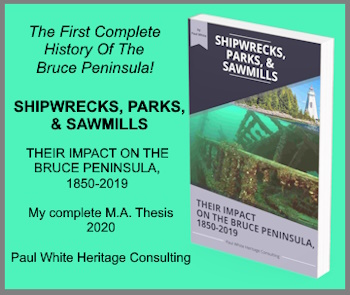Sailing Season Closing: A Frantic Time on Peninsula
Sailing Season Closing was a frantic time on the peninsula as ships raced from port to port delivering and picking up passengers and produce before the waterways froze.
As the holiday season approaches and the winter freeze-up of the harbour comes nearer, concern about travel and the shipment of goods causes us little worry today. However, during the early days of settlement the onset of winter meant the beginning of isolation from the rest of the world.
In the Wiarton Echo's Dec. 5, 1879, edition the newspaper's correspondent from Manitowaning put a somewhat ironic slant to the impending isolation forced on that community by the coming of winter and the sailing season closing.
"Navigation is almost closed, and for about six months our only communication with the outside world will be by dog train. Some people might be inclined to pity the lot of us poor Islanders, but we can assure them there is no need for it; as a gentleman put it last winter, 'if that insignificant portion of the universe known as the outside world can get along without us, why we can surely get along without them.”
For communities such as Wiarton and Tobermory -- where the coming of the railroad was a distant reality and the few existing roads were often impassable for much of the winter months and the communities on Manitoulin Island where the winter freeze-up of the Great Lakes meant no water traffic — winter presented isolation and self dependency. Food supplies were available in limited quantities from the local merchants.
Therefore, the months leading up to winter were spent harvesting and storing what the family had grown on their own land or buying food staples from neighbours.
The Echo reported in each issue the almost frantic comings and goings of vessels from the local harbour. Each ship carrying goods to sustain the community for the coming months and leaving with produce for other markets.
In the Dec. 5, 1879 edition of the Echo noted that the Wiarton Belle “left here on her last trip to Owen Sound yesterday morning."
In the same edition it was announced that the "Presqu’isle light will be shut down for the season Friday night ... Griffith's Island and Owen Sound lights closed today.”
In the December 12, 1879 edition of the Echo the editor extolled the efforts of the Prince Alfred's captain and crew for continuing to try to maintain a service between Owen Sound and Wiarton. The editor suggested that the citizens of Wiarton were grateful for their bravery.
The uncertain weather conditions at this time of year as the closing of the sailing season approached, the frenzied pace to get passengers and goods from one harbour to another led to the increased possibility of shipping disasters.
Throughout Georgian Bay's history of maritime travel there were many ships that experienced close calls, groundings, and sinkings as the sailing season closing approached.
In fact, the infamous sinking of the Waubuno and many other legendary disasters occurred in the months of November and December when the race against the elements was at its most furious pace.
Not all the close calls were disastrous. In fact, a trip made by the Jane Miller in November 1879 illustrates how Grey-Bruce travellers coped with the hardships imposed on water transportation by the weather.
About an hour after leaving Owen Sound on her way up the peninsula to Manitoulin Island the Jane Miller encountered a violent storm. Rather than returning to Owen Sound she continued on her course, often seeking refuge in harbours when conditions became too dangerous.
It was reported that in one harbour the passengers landed and picked beech nuts, and at another location they gathered cordwood.
For five days the Jane Miller's fate was unknown. When she finally arrived at her destination the Echo reported "the arrival of the first boat of the season or the departure of the last could not have created greater excitement. "
So incredible was the saga of the Jane Miller the editor of the Echo suggested that "the Jane had better be given a contract for carrying mail matter. "
The dangers involved in maritime travel and the urgency of the onset of winter brought the inhabitants of these isolated communities closer together which may have served to sustain them throughout the months of winter isolation.
I would like to suggest to our neighbours on the Bruce Peninsula that when you jump in your car and drive into Owen Sound or other more southerly points to go Christmas shopping or just to buy groceries, consider the conditions that the pioneers of your area faced during the holiday season not too long ago.
An version of this article was originally printed in my Local History column in the Owen Sound Sun Times in the autumn of 1994.
Georgian Bay Shipping
List of Lighthouses on the Great Lakes: If you have names and/or pictures of Great Lakes Lighthouses please submit them along with details of their location.
Georgian Bay Ships: A List of all the ships that sailed on Georgian Bay until the 1960s. This list is not complete. If you know of a ship that sailed the waters of Georgian Bay please contact me with information about that vessel, and, if you have a picture that I could post with it, that would be much appreciated.
1885: A Memorable Summer Job for Owen Sound teenage boys on the Great Lakes would have historic importance, not mention a possible exciting career opportunity.
Hindman Transportation Company was a well-known Great Lakes shipping company for many years. Here you will find pictures of many of the Hindman ships
Owen Sound Harbour – A Photographic History, by Robert A. Cotton is a book that interests my historiographical curiosity.
Commercial Great Lakes Fishing It is probably safe to suggest that the commercial fishing industry was an important part of the early growth of this region.
A Georgian Bay fishing vacation has long been a popular attraction in the Bruce Peninsula region. During fishing derbies, the regional waterways are dotted with fishing boats of all shapes and sizes.
The Georgian Bay Mackinaw, designed by William Watts of Collingwood is an example of a Georgian Bay innovator creating a vessel to service the needs local mariners.
Great Lakes fishing is an asset that is protected and developed, not only for its economic potential but also for those who just enjoy spending a day by the side of a river or in small fishing boats trying to catch “the big one”!
Great Lakes Fishing History is not without its controversy. The impact of the fishing industry was such that it played an important role in the development of communities along the Georgian Bay and Lake Huron shoreline.
Georgian Bay Travel Before the Winter Freeze-Up could be a dangerous time for mariners in the early years in this region.
A Harbinger of Spring on the Great Lakes in pioneer times, was the eagerly awaited news that a lighthouse had been lit and shipping traffic could begin sailing from port to port.
Lumber Hookers Lumber hookers and tugs were an important innovation to improve the transportation of lumber on Georgian Bay.
Mapmakers on Georgian Bay were also explorers. They mapped the Georgina Bay shoreline noting safe harbours, dangerous reefs and other guides for sailors and pioneer settlers looking for a place to call home.
Paddling Georgian Bay & Pondering: traversing parts of this great waterway in a canoe leads one to wonder about the ships of a bygone era battling the rough seas they encountered.
Parry Sound Shipping History: The Parry Sound area has always been connected to the southern regions of the Province of Ontario by a system of good roads. Or has it?
Parry Sound’s shipping history 2 is more than the tragic sinking of the Waubuno or the later catastrophe surrounding the sinking of the Asia.
Sailing Season Closing: A Frantic Time on Peninsula as ships raced from port to port delivering and picking up passengers and produce before the waterways froze.
Ship Captain Andrew Port was not only a dynamic and brave Georgian Bay mariner, he was a personal favourite historical character of mine.
Ships Stuck in Ice: The Oak Glen was icebound in 1996 but this sailing hazard has been impacting vessels on Georgian Bay since the beginning of time.
Lake Huron shipwrecks, the Hibou often occurred in the Georgian Bay region of that Great Lake due to the often violent waters that could strike unsuspecting vessels like the Hibou.
Shipwrecks: The "Asia" wrecked off the eastern coast of Georgian Bay taking all but two of the more than 100 passengers to a watery grave.
Masters, Mates, and Pilots Association created its first Canadian chapter on Georgian Bay, providing maritime safety education, and other seafaring issues to better inform its membership.
Pioneer Travel Aboard the Fly Tells the story of a sailing vessel as the tenuous link between survival and death in a pioneer settlement in the 1840's in Upper Canada.
Sailing Stories: the Captain Who Smelled his way into Port The Captain Who Smelled his Way into Port details how pioneer seamen on Georgian Bay safely sailed the rough waters without the aid of the modern technological tools so readily used by today's mariners.
Sailing Story: The Voyage of the Prince Alfred the incredible voyage of the Prince Alfred, fraught with danger for both vessel and the crew in the winter of 1880.
Shipbuilding As the southern Georgian Bay region became more populated shipping traffic increased to meet the needs of an expanding market place.
The Summer of 1844 was No Picnic for the early settlers in the pioneer area near what would become Owen Sound on Georgian Bay.
The CPR Grain Elevator Fire of 1911 spelled the end of Owen Sound's role as the eastern terminus of the CPR Great Lakes Fleet.
Georgian Bay shipping occurred long before the first Europeans paddled these waters. But the fur and timber trades opened Georgian Bay to shipping in a big way!





